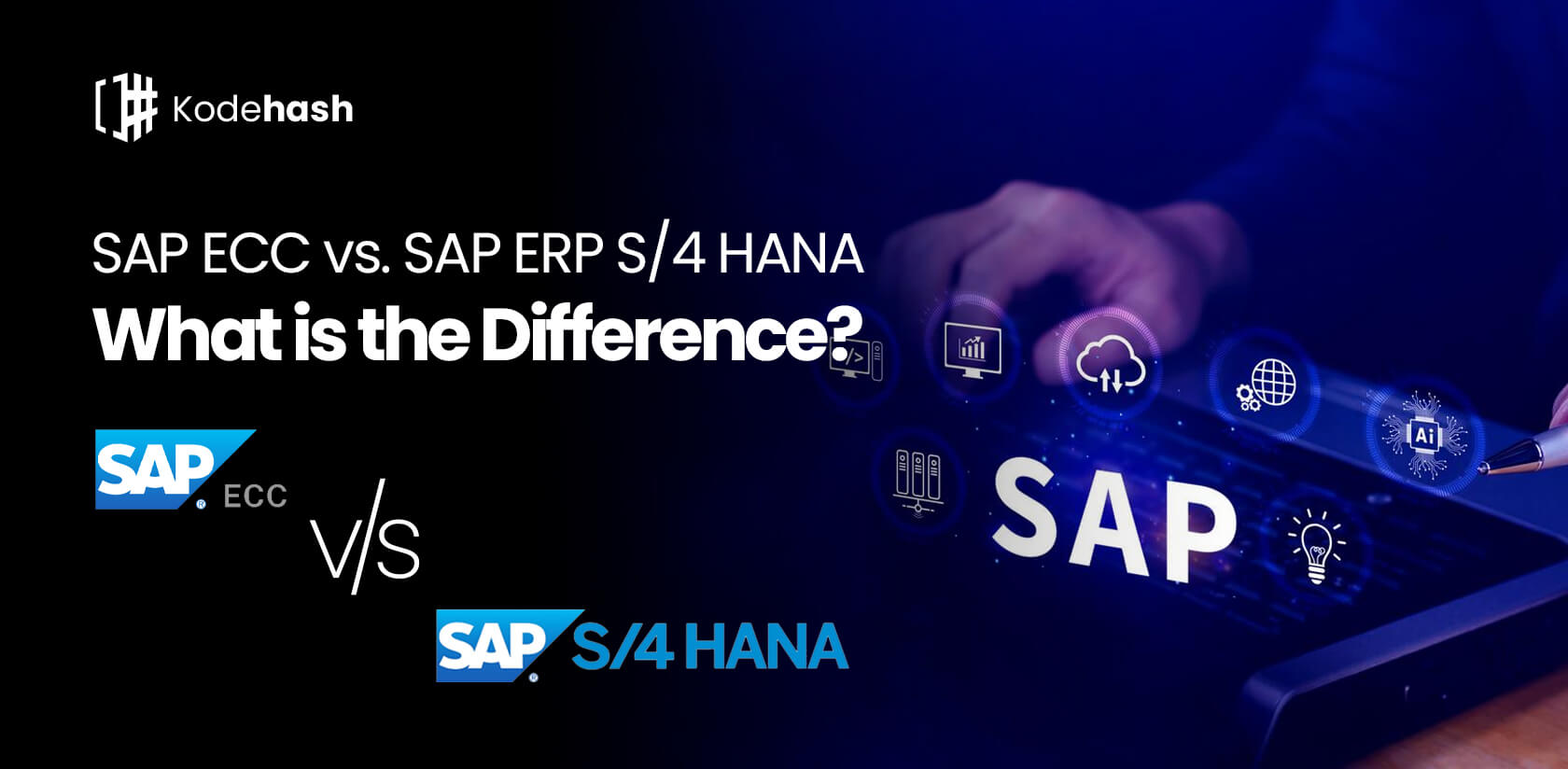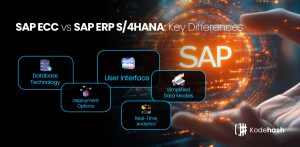SAP ECC vs. SAP ERP S/4 HANA: What is the Difference?

SAP Business Suite is a collective application for smooth-running operations. The operations include data management with overall business processes improving efficiency for various industries. Among all applications, the two prominent solutions SAP ECC and SAP ERP S/4 HANA often come forefront for comparison. Businesses do compare these two solutions as per their capabilities and relevance to meet modern needs. However, what is the real difference between these two platforms, let’s check in this blog. Let’s find out the SAP ECC and SAP ERP S/4 HANA differences, know the SAP ERP and SAP ECC in full form, and what are their capabilities as per different business needs.
What is SAP ECC?
SAP ECC full form is SAP ERP Central Component, known as a prominent ERP solution. After its release in the early 2000s, this traditional form offers tailored solutions to handle business operations while meeting each industry’s demands. This platform’s uniqueness lies in its flexibility in custom solutions. Various business process modules include prominent fields such as finance, logistics, HR, etc. This is a traditional database platform that includes IBM DB2, Oracle, and Microsoft SQL Server for the process.
Key Features of SAP ECC

- Modular Architecture: Businesses apply ECC-enabled single modules to meet their demands. Because organizations are looking for independent work from modules. Or they want an integration version over different departments.
- On-Premise Deployment: On the company’s infrastructure SAP ECC does the deployment to give businesses total control on their systems.
- Integration Capabilities: SAP products are easily integrated with ECC for third-party applications.
- Customization: Flexible customization options are available at SAP ECC. It makes businesses run easily on any platform as per their exclusive requirements.
What is SAP ERP S/4HANA?
This SAP development platform is a next-generation ERP solution. Business Suite 4 SAP HANA in short is named S/4HANA. It is designed to meet emerging digital business demands. This platform is built on SAP’s in-memory HANA database and released in 2015. The involved solutions here are advanced analytics, processing speeds, and simplified data models.
SAP S/4HANA’s Key Features
- In-Memory Computing: Businesses can process large volumes of data with HANA support for faster decision-making with real-time analysis.
- Simplified Data Model: HANA provides a single source of data for reporting and analysis by minimizing the complex data for businesses.
- On-Premise/ Cloud: S/4HANA provides flexible deployment on Cloud and on-premise deployment. At SAP ECC solutions are available on-premise.
- Intelligent Automation: AI and Machine learning features with S/4HANA offer auto routine tasks and data-driven insights identification for businesses.
SAP ECC vs SAP ERP S/4HANA: Key Differences

Both platforms are prominent ERP solutions, but there are several differences. Businesses can check each one’s capabilities before using them. The differences are based on performance, data processing, and long-term strategy. Check out the prominent differences:
Database Technology
The running database is the first noticeable difference between SAP ECC and SAP S/4HANA. Traditional databases such as Oracle /IBM are favorable operations for the SAP ECC platform. At the same time, SAP ERP S/4HANA is especially built on the SAP HANA in-memory database. SAP HANA databases give performance benefits to SAP ERP with real-time processing and running of complex queries.
Businesses that are dealing with large data amounts need to check out these both ERP solutions differences. When we compare both platforms on the basis of receiving quicker insights, faster data retrieval, and faster business processes then S/4 HANA \’s in-memory technology will beat SAP ECC.
User Interface
SAP Fiori interface is the modern user experience. SAP S/4HANA provides this offer for intuitive and mobile-friendly designs to improve user experience on all devices. In reply to SAP Fiori, SAP ECC is offering SAP Graphical User Interface(GUI) to the world. However, SAP GUI is not user-friendly as it is an older version. We can say it won’t be able to meet all modern business needs.
SAP Fiori enables users to tailor their dashboard. It provides a streamlined interface to get faster access to receive relevant data and tasks. As a result, it will benefit employees and improve productivity within a reduced training timetable.
Simplified Data Models
When we bring the comparison on receiving simplified data models then more votes go for SAP S/4 HANA instead of SAP ECC. It reduces performance optimization and redundancy in its simplification process. For instance, S/4 HANA’s financial modules are integrated into one module named SAP Finance, whereas in ECC you will find separate sections for finance and controlling. This difference defines how S/4HANA can process real-time transactions and analytics in comparison to SAP ECC.
In reply to this process, SAP ECC is providing more complex data modules. These complex data models demand more storage space. Even the data retrieval time is longer in this ERP platform. After comparing both platforms for simplified data models, businesses appreciate S/4 HANA more because of its salable streamlining designs.
Deployment Options
SAP ECC on-premises provides organizations complete control over their hardware and software systems. Businesses get the benefits of stringent data security and tailored needs. The deployment options also include higher infrastructure and maintenance costs.
Businesses receive multiple deployment options with SAP S/4 HANA that include on-premise, hybrid, and cloud models. These multiple cloud options minimize on-site hardware requirements and even reduce operational costs. As a result, businesses get the opportunity to install attractive modernized ERP systems.
Real-Time Analytics
Real-time analytics can change the face of modern businesses. Companies, when entered into the system, will be able to do data analysis with the help of SAP S/4 HANA’s in-memory database. It is a complex requirement that most companies for instance finance, manufacturing, retail, etc need to make on-time decisions to have a direct impact on profitability.
At the same time, SAP ECC faces problems matching real-time capability features as it is running on traditional databases. However this platform can generate reports and insights, but there is a noticeable lag in comparison to the quick results that S/4HANA offers.
Which Solution Is Right for Your Business?
There are several factors you need to consider before selecting the right platform for your business. Both SAP ECC and SAP ERPS/4HANA have their own characteristics. Before selecting the suitable one, check out the factors such as business size, and specific requirements.
- Small and Medium-Sized Enterprises (SMEs)
ERP solutions meet the demands of all small and medium-sized enterprises. And mostly choose S/4HANA as it is more flexible and future-friendly. Its scalability and cloud deployment options give it a good start to be liked by more companies. The other reasons taken into account are real-time insights, simplified data modules, and AI-driven automation. These features prominently benefit emerging companies.
- Large Enterprises
SAP ECC helps large enterprises in resolving complex operations. If companies already have tailored solutions built on ECC, then SAP ECC is the most suitable option. However, as SAP is planning to stop supporting ECC by 2027, it is wise for large organizations to plan for a migration to other platforms. When they are planning for migration they must go for S/4 HANA to stay fast-forward with technology advancements.
- Industries with Real-Time Demands
The industries such as healthcare, manufacturing, and finance always looking for real-time data in their services. Fast services are not possible with ECC as it has a slower data processing service. Therefore such industries go for SAP S/4HANA to get benefits of real-time processing and better analytics capabilities.
The Migration Path: Moving from SAP ECC to S/4HANA
The businesses who are still using ECC need to reconsider after seeing SAP’s future roadmap. As SAP is ending its support for ECC in 2027, companies should adopt a migration strategy to S/4HANA. This process may seem a daunting task for now, but it has its future benefits. When you are going to meet modern days’ technological challenges this migration will help you a lot at that time. It is wise to leverage S/4HANA’s advanced features, if you want to remain in the competition.
You will find two migration options for businesses:
- Greenfield: Fresh SAP S/4HANA implementation from scratch. This enables businesses to rethink their process. And avoid the technical issues from their old systems.
- Brownfield: Existing ECC data with a system conversion and adopt S/4HANA customized environment.
Both approaches have their own benefits. It is now your decision which one to choose as per your business’s current setup and meeting the long-term goals.
Kodehash is Your Trusted Partner for SAP Implementations
When businesses are seeking a smooth transition from SAP ECC to SAP S/4HANA, partnering with experienced companies will make a difference. Kodehash is here for you. Its comprehensive services provide support for both SAP ECC and SAP S/4 HANA implementations. Kode Hash’s expertise in ERP services helps businesses to make a seamless migration process with minimal downtime to gain maximum efficiency.
Kodehash custom solutions perfectly match your unique business needs. Whether it is Greenfield or Brownfield migration, Kodehash ensures a smooth transition to S/4HANA. The transition is not only smooth but also aligned to your strategic goals in a cost-effective manner.
Final Thought
SAP ECC has been the backbone of many enterprises till now. However, as now time is changing, businesses need to modify their strategies. Whereas S/4HANA offers the right tools for businesses to compete effectively in the market. When we compare both, S/4HANA will get the majority with its real-time capabilities, superior performance, and flexibility features. These factors give a clear choice for businesses to use this platform instead of SAP ECC. It is the best ERP solution for businesses who are looking for future-proof operations.
Either searching options for staying with ECC or want to migrate to S/4HANA, in both ways you are aligning your ERP strategy with SAP to meet business objectives. Whatever may be your choice, when you are ready to make a shift, Kodehash is here to guide you in every step.
Recent Blogs
Subscribe:
Subscribe for the newsletter and receive email notification of every future post.




